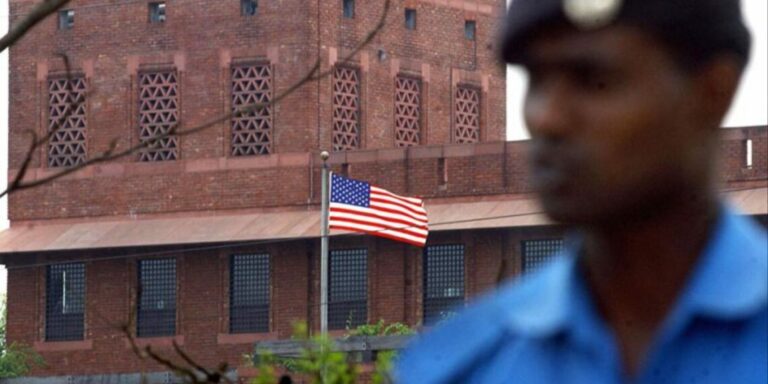A series of WhatsApp messages exchanged between top US embassy diplomats in Dhaka and key advisers in the Mohammad Yunus-led interim government reveal a pattern of direct intervention, strategic guidance and policy influence by the United States on Bangladesh’s internal affairs—including governance, judiciary decisions and trade negotiations, said sources in Bangladesh intelligence wings.
Sources confirm that US diplomats routinely send out policy suggestions, instructions and even strategic directives to a select group of interim government advisers via WhatsApp. These exchanges are described as “frequent,” often taking place in one-on-one conversations or through a WhatsApp group created shortly after August 8, 2024.
Most advisers reportedly welcome this communication, responding to both macroeconomic directives and micro-level ministry-specific concerns.
A diplomatic message that raised eyebrows
In one notable incident, a June 2025 message from an unnamed American diplomat to a senior female adviser—known for her closeness to Yunus and the US embassy—contained a 298-word message that some insiders described as bordering on “hectoring.”
The message referenced negative US Trade Representative (USTR) feedback regarding Bangladesh’s Commerce Secretary and urged immediate compliance with the Reciprocal Tariff Framework Agreement. The diplomat warned that the White House viewed the agreement not as a subject for negotiation but a “take-it-or-leave-it” condition — comply and avoid tariffs, or reject and face 37 per cent tariffs.
“I would humbly suggest you put together a Dream Team to work on this between now and Monday afternoon, when Washington opens,” the message concluded.
The diplomat also offered US support in building consensus among political parties, even suggesting the embassy host breakfast or tea meetings to bring them on board.
Ties to the Embassy: The ‘Inner Circle’
The adviser who received the lengthy message reportedly shares close ties with Law Adviser Asif Nazrul, whose wife, Sheila Ahmed, is employed as an Economic and Commercial Specialist at the US embassy in Dhaka.
Other key advisers—especially those involved in documenting human rights violations, disappearances under the Awami League, or overseeing crucial ministries—are also known to be in regular communication with US officials.
One such adviser, born in 1953 in Chittagong and married to a poet with links to Hizb-ut-Tahrir, reportedly started receiving WhatsApp instructions soon after the Yunus administration took charge.
Judicial interference raises serious concerns
Perhaps most alarming are recent developments suggesting direct diplomatic involvement in judicial outcomes. In May 2025, a senior US diplomat met a top judge of Bangladesh’s Supreme Court. Days later, on May 28, the Appellate Division—led by Chief Justice Syed Refaat Ahmed—released convicted war criminal ATM Azharul Islam, a senior Jamaat-e-Islami leader previously sentenced to death for 1971 war crimes.
Law Adviser Asif Nazrul reportedly welcomed the verdict
Shortly after Azharul’s release, the same Appellate Division overturned a prior High Court ruling that had canceled Jamaat-e-Islami’s registration as a political party — marking a critical shift in the legal standing of a controversial political group.
Leadership vacuum at US Embassy in Dhaka
The US embassy in Dhaka has remained without a permanent ambassador for over a year. Peter D Haas, who vacated the post on July 23, 2024, now serves as Strategic Adviser to Texas-based Excelerate Energy, though he continues to visit Bangladesh regularly.
In January 2025, the Biden administration appointed Tracey Ann Jacobson as ad interim Chargé d’Affaires, a move intended to bypass Senate confirmation. Jacobson, a veteran diplomat with past postings in Tajikistan, Turkmenistan and Kosovo, now oversees US diplomatic engagement with Bangladesh during this critical transitional period.
Shadow diplomacy or strategic partnership?
The scale of involvement — from economic directives and political consensus-building to potential judicial influence — raises serious questions about the sovereignty of Bangladesh’s interim government and the nature of its partnership with the United States.
With the Yunus-led administration under increasing scrutiny and the judiciary showing signs of shifting alignments, these WhatsApp revelations highlight the blurred lines between diplomacy and interference in one of South Asia’s most politically volatile states.
Long or Short, get news the way you like. No ads. No redirections. Download Newspin and Stay Alert, The CSR Journal Mobile app, for fast, crisp, clean updates!
App Store – https://apps.apple.com/in/app/newspin/id6746449540
Google Play Store – https://play.google.com/store/apps/details?id=com.inventifweb.newspin&pcampaignid=web_share


